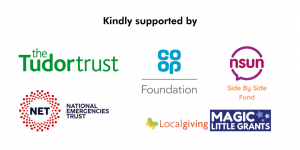Last week was Mental Health Awareness Week, and it got me thinking. Princes William and Harry have been doing incredible work reminding the country that it is ‘#oktosay’ – encouraging us all to speak up about how we’re feeling and break down the stigma surrounding mental illness. I’m passionate that talking can cure most things, and have started this website with the aim of showing others that we need to talk about loss, grief and death.
So why can’t I tell people that I’m not ok?
There are lots of acceptable responses when someone asks if you’re ok, but everyone’s favourite is the classic “fine thanks, how are you?” That makes me so angry! Fine is such a non-word – it conveys none of the reality of your emotions, and is short, easy excuse for avoiding the question. When my friends tell me they’re fine, I ask them another question – pushing and prying to get more information – until I find out that they actually had a really challenging day at work, or just received great news, or need my help in some way. That makes for meaningful conversation and makes me a better friend.
“Because the truth is, I’m not fine”
But recently I’ve been telling people I’m fine. A lot. Maybe no one has noticed – it’s such a universally accepted word, and once I’ve returned the question, they can agree that they are fine too and we can move on. However, I’ve noticed and it worries me. Because the truth is, I’m not fine. In the last week alone I’ve felt sad, angry, frustrated, lonely, lost; and I’ve cried on more than one occasion. I haven’t always answered fine – this week I’ve also felt joyful, excited, thankful, passionate; I’ve danced and laughed and smiled lots of the time, and it’s been easy to share those feelings. But mostly I’ve avoided being honest when things haven’t been so great. People would rather hear about what made me laugh than what made me cry.
We all need to change
I need to take my own advice, and talk through the taboos. I need to stop feeling ashamed that I had to go to my housemate, sobbing, and ask for a hug. Maybe I won’t share it with the cashier in Co-op but there are people in my life who I can talk to and will listen, without judgement, and understand. I’m going to start seeing a counsellor again – I’m not too proud to admit that grief is confusing and conflicting and constant, and I can’t cope with it alone.
“How could you know that when I replied to your text, I was slumped on my floor sobbing?”
It’s ok to say you’re not ok – whatever it is you’re dealing with. So maybe next time you ask me how I am, I’ll actually tell you. I won’t always want to. But sometimes I’ll be honest and tell you – and you might be surprised to hear that I’m really struggling. I’ve always been good at hiding my suffering, looking like I’ve got everything in control. So if you’ve encountered me in the last week, you might be completely taken aback to know that this week has been one of my worst in a long time – I haven’t coped at all. Surprised? My fake smile and cover-up coping mechanisms are good, I’ll admit.
How you can help me
I want to offer some advice to those people who are horrified to know that I’m not ok – who didn’t realise that when I answered fine I wasn’t. How could you know that when I replied to your text, I was slumped on my floor sobbing? It is obviously impossible to know unless I tell you, but the more I talk about my mental health with you, the more likely I am to be honest and open when it’s been a rough few days.
“I want to talk about loss, and I want you to talk about loss”
My wonderful friend Lizzi has written a blog post on mental health, and though it’s not about dealing with loss or grief, she articulates really well why it’s important to talk. Here’s a short excerpt of what Lizzi wrote:
As mental health awareness week draws to a close, wouldn’t it be great if we could all be more intentional in conversations with those who don’t quite seem alright, even though they’ve said they are? Wouldn’t it be great if we could all stop calling people ‘crazy’ for their erratic behaviour or mood swings because just maybe, that word is going to enforce upon them the belief that the mental health problem makes them somehow less valuable than others who do not suffer from poor mental health? Wouldn’t it be great if people with mental health issues felt able to be as open and honest with their peers about their emotional and psychological pain as they can be about their physical health? Be kind. Be open. Be aware.
Maybe you’ve noticed that I’m not ok. Don’t be afraid to ask if there is anything you can do. I wish more people would ask me to talk about my mum – sharing memories keeps her alive and telling people about her means more people get to know and love her. Don’t be scared of the taboos that society has created – I want to talk about loss, and I want you to talk about loss.
Have a story you would like to share? Email blog@letstalkaboutloss.org.



